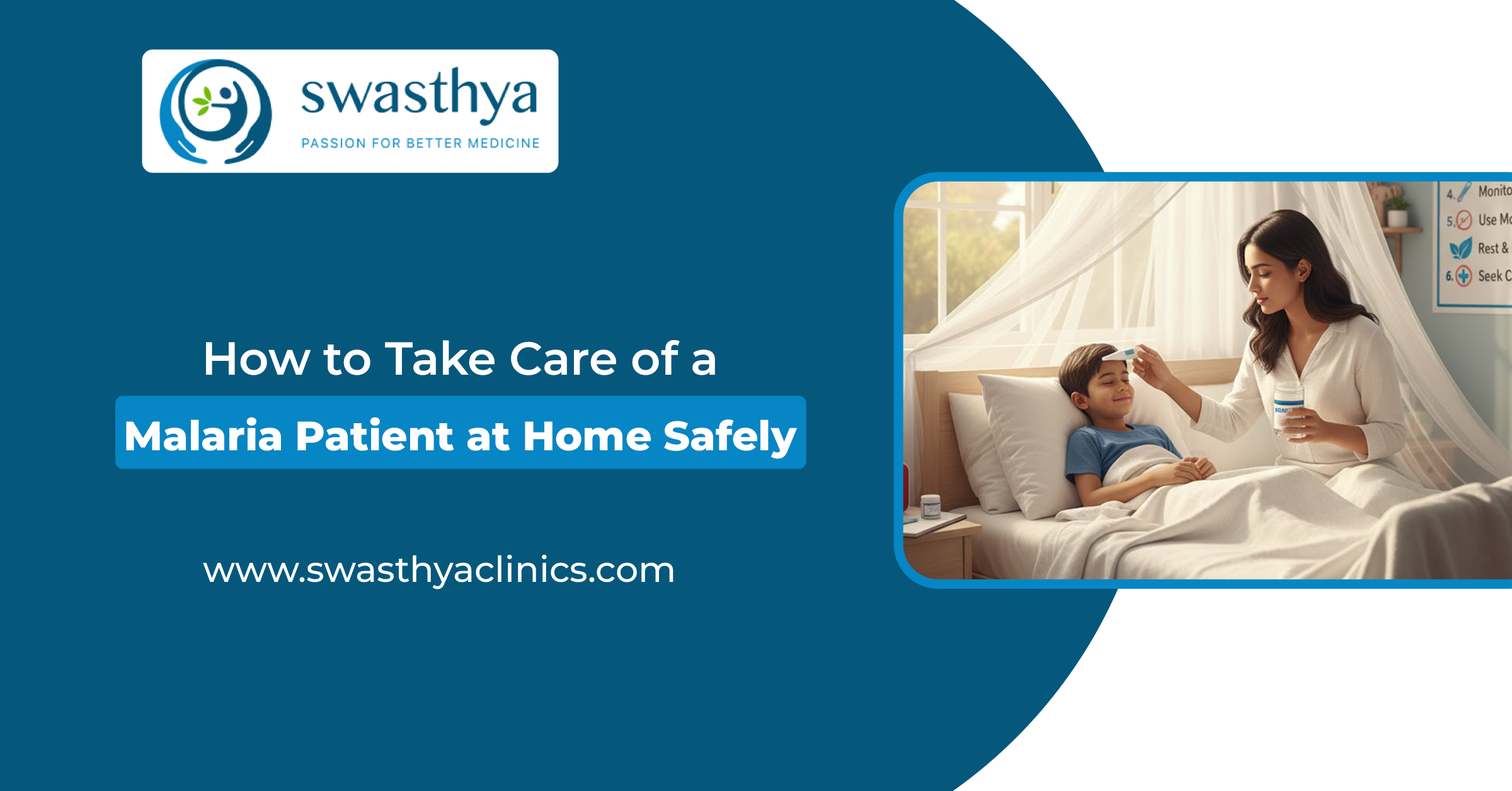-
Mail us
-
Mon to Sat
Call Us now

Book An Appointment
Swasthya Clinic, Jaipur is one of the advanced super-specialty clinics, that provides world-class treatment for asthma, allergy,diabetes, fever, joint pain, headache and migraine, etc. book an appointment now at +91 7300041110.

dr. Rahul Mathur
Associate Consultant - Internal Medicine
MD (Gold Medalist)

Dr. Raman Mathur
Experienced Emergency Physician In Jaipur
MBBS, DNB Emergency Medicine
How To Take Care Of A Malaria Patient At Home Safely

- Admin
- Oct 30, 2025
Drugs cure malaria, but home care heals the patient.” This simple statement is why recovering from malaria doesn’t end with the tablets and prescription. Much of their stories would be familiar to us who treat malaria, which is transmitted by mosquito bites and typically comes with high fever, chills, weakness, and loss of appetite. Once a doctor begins treating you, the family’s job is just as important. The care of home, good food, and emotional support can be gems in the healing process. That’s where malaria patient care at home becomes crucial.
Understanding this, it’s an element for home care tips for malaria.
Why Home Care Matters
Doctors can prescribe the right medicines, but a patient spends most of their recovery time at home. The illness can leave them weak, tired, and sometimes emotionally drained. When handled properly, home care not only reduces suffering but also prevents complications. For families, understanding a simple yet effective malaria home treatment guide makes the difference between slow recovery and a smooth one.Keep the Body Hydrated
Dehydration is common in malaria because of fever and sweating. Patients may not even feel like drinking water, which makes things worse. Caregivers should encourage frequent sips of clean water, coconut water, fruit juices, or light soups. If the doctor suggests, oral rehydration solutions can also be given. Staying hydrated reduces fatigue and helps the body fight infection better. This simple step is one of the most valuable home care tips for malaria patients.Food Choices that Aid Recovery
Malaria makes the body weak, so balanced food is necessary. Provide light and frequent meals as a part of malaria patient care at home in order to help build up energy.Recommended foods:
- All seasonal fruits like banana, papaya, or apple for natural vitamins.
- Vegetables prepared at home, like bottle guard, pumpkin, or carrot.
- For a soft energy that lasts through the day, plain khichdi and upma.
- Light proteins such as moong dal, soft paneer, or boiled eggs.
- Stay away from oily, fried, or spicy food for complete recovery.
Rest and Comfort Are Healing Tools
Rest is not just lying down; it’s giving the body time to repair itself. Malaria patients should have a quiet, clean, and mosquito-free room.- Use mosquito nets around the bed
- Wash and change bedding regularly
- Keep the room airy but comfortable in temperature
Watch Symptoms Carefully
The symptoms of malaria may vary, so paying close attention is important. One day, it may give you a high fever; the next might be filled with chills, fatigue, or nausea. Families must maintain a careful vigil for symptoms, such as small changes in the patient’s condition.- Checking the temperature at regular intervals
- Observing frequent vomiting, dizziness, or unusual weakness
- To get follow-up help promptly if things deteriorate
Medicines Should Never Be Skipped
It’s common for patients to feel better after a few days and think the illness is gone. But malaria parasites may still be in the body. If medicines are stopped early, relapse is likely. Caregivers should ensure:- Every dose is taken on time
- The complete course is finished
- Any side effects are reported to the doctor
Hygiene and Mosquito Protection
Home surroundings must be kept clean so that no fresh mosquito bites happen. Families should:- Remove stagnant water
- Cover containers storing water
- Keep doors and windows screened
- Use repellents, coils, or nets
Care Beyond Medicines: Emotional Support
Malaria is not just a physical illness; it makes people weak, irritable, and fretful. Family and social support are integral when you’re in the midst of recovery. Gentle encouragement, soothing words, and reassurance can help alleviate stress and lift morale. Emotional caring is a part of treatment, and feeling emotionally safe is likely to heal an individual, physically.Understanding this, it’s an element for home care tips for malaria.
Final Thoughts
Recovery from malaria takes patience and steady support. Nutritious food, regular hydration, proper rest, and hygiene together build the path to safe healing. Families should stay alert and caring while ensuring medical advice is followed properly. And when professional help is needed, consulting a trusted Malaria Doctor in Jaipur ensures the patient gets the best possible treatment for a complete recovery.Book An Appointment
Please feel welcome to contact our friendly reception staff with any general or medical enquiry. Our doctors will receive or return any urgent calls.



